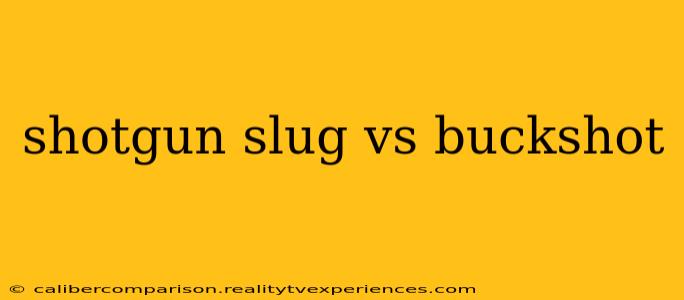Choosing the right ammunition for your shotgun is crucial, whether you're hunting game or protecting your home. Two popular choices are slugs and buckshot, each with distinct advantages and disadvantages. This comprehensive guide will delve into the key differences between shotgun slugs and buckshot, helping you make an informed decision based on your specific needs.
Understanding Shotgun Slugs
Shotgun slugs are single projectiles designed for long-range accuracy. Think of them as shotgun bullets. They offer significantly greater range and accuracy compared to buckshot, making them ideal for hunting larger game animals at longer distances.
Advantages of Slugs:
- Accuracy: Slugs are far more accurate than buckshot, allowing for precise shots at longer ranges. This is crucial for ethical hunting practices.
- Range: Their aerodynamic design enables slugs to travel much farther than buckshot, extending the effective range of your shotgun.
- Penetration: Slugs possess superior penetration power, making them effective against larger and tougher game.
Disadvantages of Slugs:
- Limited Pattern: Unlike buckshot, slugs fire a single projectile, meaning you only have one chance for a clean shot.
- Recoil: The heavier weight of slugs results in stronger recoil, especially noticeable in lighter shotguns.
- Overpenetration: The high penetration of slugs poses a significant risk of overpenetration, especially in close quarters or densely populated areas. This is a critical concern for home defense scenarios.
Understanding Buckshot
Buckshot consists of multiple pellets contained within a single shell. These pellets spread out in a pattern, offering a wider spread than slugs but with less accuracy at longer distances.
Advantages of Buckshot:
- Multiple Projectiles: The multiple pellets increase the chance of hitting the target, especially at closer ranges. This is beneficial for home defense situations.
- Stopping Power: Buckshot delivers significant stopping power at short to medium ranges, effectively incapacitating a threat.
- Shorter Range Effectiveness: Buckshot's effectiveness is generally better at closer ranges due to its wider spread.
Disadvantages of Buckshot:
- Reduced Accuracy: Buckshot's accuracy decreases significantly at longer ranges due to pellet spread.
- Shorter Range: Buckshot's effectiveness is limited compared to slugs, especially beyond 25-30 yards.
- Overpenetration (Potential): While less than slugs, overpenetration remains a concern with buckshot, especially in confined spaces. The risk is reduced with the use of reduced recoil buckshot loads.
Slug vs. Buckshot: The Key Differences Summarized
| Feature | Slug | Buckshot |
|---|---|---|
| Projectile Type | Single projectile | Multiple pellets |
| Accuracy | High | Lower |
| Range | Long | Shorter |
| Penetration | High | Moderate |
| Stopping Power | High (single impact) | High (multiple impacts, close range) |
| Recoil | Higher | Lower |
| Ideal Use | Hunting large game at long range | Home defense, hunting smaller game |
Choosing the Right Ammunition: The Bottom Line
The best choice between slugs and buckshot depends entirely on your intended use. For hunting larger game at longer distances, slugs are the clear winner. For home defense or hunting smaller game at closer ranges, buckshot is generally the better option. Always prioritize safety and practice responsible firearm handling. Consider taking a professional firearms safety course to learn more about proper ammunition selection and safe firearm handling practices. Remember to always check your local laws and regulations regarding ammunition usage.

